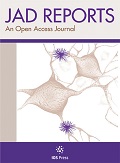Authors: Kostev, Karel | Osina, Galina
Article Type:
Research Article
Abstract:
Background: Studies on prevalence or the therapy of dementia are rare or non-existent in Russia. Objective: The purpose of this study was to analyze the prescription patterns of antidementia therapy in Russia in 2018. Methods: This retrospective cross-sectional study was based on the IQVIA Russia LRx database, which covers approximately 11% of all patients enrolled in federal or regional reimbursement state healthcare programs. We descriptively analyzed the proportions of patients treated with antidementia drugs, antipsychotics, antidepressants, and benzodiazepines. Results: A total of 12,051 dementia patients were available for analysis. Of those, 6,394 patients had
…a vascular dementia (VaD) diagnosis, while 3,413 were diagnosed with dementia in other diseases (DOD), 1,128 with Alzheimer’s disease (AD), and 1,116 with unspecified dementia (UD). The therapy with the highest patient proportion was antipsychotics, with 74% of VaD patients, 73% of UD patients, and 47% of DOD patients receiving these drugs. The proportion of patients treated with antidementia drugs was 68% in AZ, 56% in VaD, 45% in UD, and only 9% in DOD. Antidepressants were a relatively rare therapy in dementia patients (between 4% and 12%), and 30% of DOD patients received benzodiazepines, while the proportions of patients receiving this therapy class in other dementias was low (7–10%). Most patients were treated with old-generation drugs. Conclusion: The proportion of older drugs prescribed in Russia is higher than in Western Europe, which may likely be due to their low prices, resulting in a higher chance for successful health insurance reimbursement claims.
Show more
Keywords: Antidepressants, antipsychotics, benzodiazepine, dementia, Russia
DOI: 10.3233/ADR-190144
Citation: Journal of Alzheimer's Disease Reports,
vol. 4, no. 1, pp. 9-14, 2020





